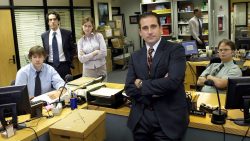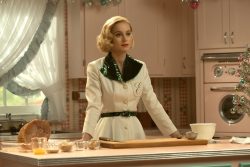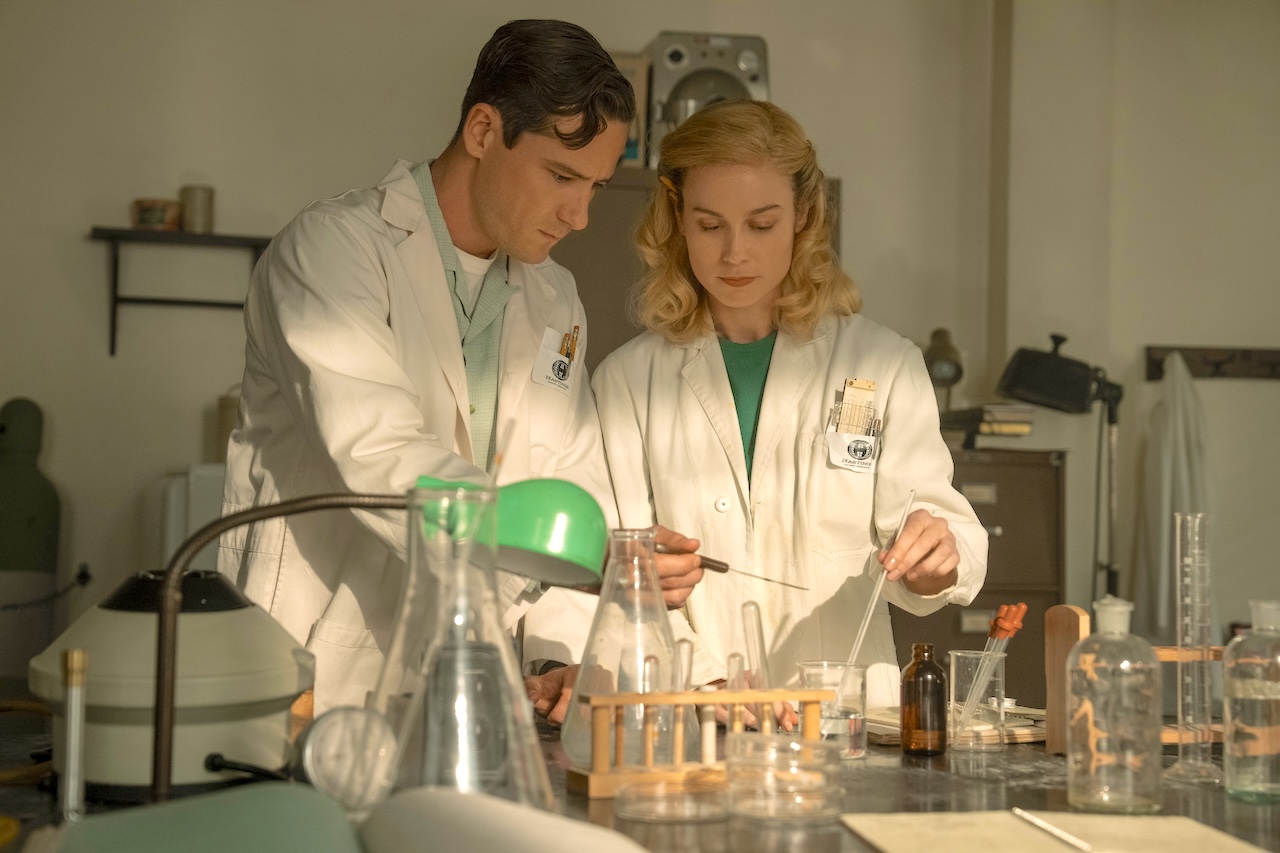“I moved out to LA in 1999 with my best friend from high school. Every summer in college, we would write a screenplay. We were waiters during the day and then at night we would write,” says Lee Eisenberg. “Primarily, we would write comedies, or at least, what we were attempting to be comedies.”
Eventually, the partnership dissolved. Eisenberg’s friend got a real job and he eventually landed a PA job on the film, Bedazzled. “I was the office PA and I met an intern named Gene Stupnitsky (No Hard Feelings, Bad Boys) who was working for Harold Ramis.”
“We started writing together, sold a few ideas to Larry David for Curb Your Enthusiasm, then wrote a pilot about two loser magicians who were roommates and just trying to get ahead. We were the two losers,” he jokes. “We sold it to Fox. It never got made, but that was our writing sample. We got hired on The Office. Funny enough, Harold read it, liked it, and hired us to co-write the movie Year One with him.”

Lee Eisenberg
“When we were first starting off, I think jokes ruled. I’m very proud of that initial pilot, but it has no pathos. It could be animated to a certain extent. It had a lot of similarities to Flight of the Conchords or Arrested Development, and less so, The Office.” These days, Eisenberg is best known for writing The Office, Bad Teacher, Hello Ladies, Good Boys, WeCrashed, Little America, and two new series, Jury Duty and Lessons in Chemistry.
Writing The Office
“When we started working on The Office, the thing we gravitated towards is small, real, relatable. How do you tell a story as small, real, and reliable as possible? That’s what we were always excited about.” Writing for The Office fundamentally changed – or perhaps just enhanced – Eisenberg’s perspective on the small and relatable. “The other thing that changed our approach was writing for Jim and Pam. Sometimes, there were great jokes that came with that, but we were trying to tell a great, honest love story.”
In an episode called “The Fight,” for example, where Michael challenges Dwight to a fight in a local Karate Dojo, there’s a very sweet moment with Jim and Pam, where Jim goes too far (he picks her up playfully, accidentally lifting her shirt to show her midriff a few feet from co-workers).
“I remember [showrunner] Greg Daniels saying, ‘You don’t have to say everything you mean. There’s something called subtext.’ I knew what subtext was. I was an English major in college, but I had never written anything that was meant to be honest and from my own life. It was very instructive. I remember that moment.”
Eisenberg describes his five years on The Office as Grad School. “We evolved so much as joke writers and the ability to structure a half hour, but I think we were really excited with the idea of infusing our work with more pathos.” This led to Year One and even developing Ghostbusters 3 for many years with Ivan Reitman.
Working with Your Heroes
“The Ghostbusters franchise was our childhood,” says Eisenberg. “The opportunity to have lunch with Dan Aykroyd or sit with Harold and Ivan, and exchange stories… it was an amazing time.” One thing the duo learned from their heroes was how to hire great writers.
“When I’m hiring staff, I’m looking for original voices. I’m not looking for someone who can shape my material. When we were coming up, everyone wrote spec scripts. The Office. Scrubs. The Sopranos. Those were the samples. But my favorite writers really have an originality to their voice. There’s a specificity and a point of view.”
“If we’re able to meld our sensibilities, that’s where I think greatness will arrive from. It was very instructive with Ivan and Harold, who had very different approaches to producing, rewriting, all of that. With Ivan, you would write 30 pages, he would give you notes, then he would want you to write the 30 pages.”
“You might advance to page 35, so he’d read 35 pages, then go back to zero and then maybe you’d get to 38 or 49. Every line was stress tested as you got going. One rewrite might actually be eight rewrites. With Harold, Harold approached everything by theme.” He adds, “Not just a plot standpoint, but what is the story we’re trying to tell from 10,000 feet up. Then, how do you milk the comedy out of every single moment?”
From Writer to Showrunner
While working on The Office, Eisenberg started to take on more and more responsibilities. “I didn’t really even understand what a showrunner did,” he jokes. “But when we left The Office, we made a deal with ABC. We were showrunners of show called Trophy Wife. It had an amazing cast, but I said to my agent, I’ve never done this before. Everything talks to us like we’re in charge.”
Eisenberg’s agent essentially told him, “No-one is asking us, just act as if.” This advice essentially opened the door for the duo to take on each problem one step at a time. “We just did it. We had learned quite a bit from The Office. You kind of learn as you go. Hopefully you surround yourself with mentors and people that can guide you a little bit.”

Partial cast of The Office. Photo courtesy NBC.
“It’s very scary, but you have to take a leap. In short succession, we had a show ordered at HBO called Hello Ladies with Stephen Merchant. He did The Office with Ricky Gervais, but none of us had ever ran a show. So now I was running two shows and I didn’t know how to do one,” he jokes. “You just figure it out. We hired really well. Had great support. And, with every show, you just learn more and more.”
Likewise, doing the work also puts you in a position to know your strengths and weaknesses. He continues, “I also know where I’m needed. So much of showrunning is managing your and other people’s time. I don’t waste my time and I don’t waste other people’s time. If a department is singing, I don’t feel the need to stick my beak in. I hire well and trust people.”
As far as passing advice along, he recommends humility. Even if a writer is lucky enough to be the creator but they’ve never done the job before, it wouldn’t be a terrible idea to have a showrunner come in and teach them how to do the job for the first season. “Shows are happening so fast these days. I spent five years working under Greg Daniels. Now, writers can come out of film school and get ordered to series.”
Writing Jury Duty
Gene and Lee’s latest series, Jury Duty, follows the workings of the American jury trial through the eyes of a man named Ronald Gladden, who has no idea the entire case is fake. Everyone else in the show, including James Marsden, is in on the joke.
“With Jury Duty, it reminded me of early Office. Every piece of casting was really a discovery. We found these improv actors and that show is evolving on the fly. Gene and I wrote the pilot that got the show greenlit, but then a writers’ room spent weeks and weeks going through what the season would look like.”
The creators gave them some ideas, such as a field trip episode, but they really wrote more of a plot outline with great improv actors rather than a true script. “So much of it was pulling people into talking heads, giving them the notes, and letting them craft the story on the fly.”
“What excites me about my career is that I’m genre agnostic. I like to toggle between these different tones. I gravitate towards ideas and characters rather than genre. Jury Duty was an amazing challenge. With all of these things, it only works when you have talented people collaborating around you. There’s so many ways that show could have gone wrong.”
Lessons in Chemistry
In addition to Jury Duty, Eisenberg is also the creator of Lessons in Chemistry. A book adaptation set in the 1950s. The story follows Elizabeth Zott (Brie Larson) as she dreams of being a chemist, but finds herself fired, alone, and pregnant. “My wife read it initially. She’s a journalist with impeccable taste. Whatever she says, I do. She read it and thought it should be a TV series.”
“We looked it up and Apple had already optioned the rights to it and Brie Larson was attached already. I have a deal at Apple, but I cold called them and said I was obsessed with the book and I would do anything to be a part of it.” Coincidentally, they were looking for a writer. “I pitched them what I was thinking about tonally and I got on a Zoom with Brie Larson. We hit it off. She’s whip smart, charming and funny. We spoke the same language about the show. A day later, I got hired.”
Many creatives, especially those known for comedy, may not throw their hat in the ring for something so tonally different. But Eisenberg likes to credit his agent’s “fake it till you make it” advice early on so he often “acts as if” when given the opportunity.

Elizabeth Zott (Brie Larson) Photo courtesy of Apple TV+
“Everyone assumed I could do it because my title was showrunner and I was on calls and answered them. Gene and I directed Good Boys and in the midst of that, I sold a show called Little America to Apple. This was a little evolution that it wasn’t a pure comedy. Then I followed up Little America with WeCrashed.”
In some ways, in some rooms, Eisenberg is known for drama rather than comedy. “All of a sudden, I had Jared Leto and Anne Hathaway and I was the co-showrunner of a limited series with two Oscar winners. I didn’t know what I was doing. I knew a little, but I had never written an hour-long drama before. No one ever said, ‘Why is the comedy guy doing WeCrashed?’”
“I had the opposite experience [because of Little America, WeCrashed, and Lessons in Chemistry] where I would come into Apple with a comedy idea and they were like, ‘Hold on a second. You’re the guy who does limited series with movie stars.’ You can change the course of your career with material. Just look at Adam McKay. He’s gone in a totally different direction.”
Find Your Opening
It’s interesting to think back on Eisenberg’s first partnership, where one person got the stable job and he somewhat double downed on the dream. “It was a host of things. I think there was fear. The prospect of moving back to Boston felt like a failure. I was failing in LA, but moving back was the admission of failure.”
“If you went to Harvard and were on the Lampoon, you were on a feeder system. I didn’t have that. I had a handful of index cards and that’s all I really had. I thought I had some ability and what I realized early on was that whatever the delta was with a top screenwriter like Aaron Sorkin, I would just outwork everyone else.”
“The problem or advantage is that there really wasn’t a Plan B. I got hired to write an episode of JAG. I quit my day job and went to the writers’ room, wrote my outline, got noted to death, worked with another writer… it felt really bad. I was over my head, felt like a fraud, thought I was going to get fired… and I got fired.”
“When I got my first foot in the door, I was fired in a few months. That was utter devastation. Everyone who thought it wasn’t going to make it as a writer was now validated. I remember having to call my dad and breaking down in tears. It was brutal. When you get so close to your dream and it doesn’t work out, that was horrible.”
“So part of me felt like I should go to culinary school, but I didn’t want to go back to Boston and I wasn’t ready to quit. I think within six months of that, Gene and I sold some ideas to Larry for Curb. It wasn’t a lot of money but having someone of Larry’s caliber read and respond the way he did was validation that maybe there was a career for me.”
“I couldn’t control my talent and I thought maybe through hard work, my talent would increase, but I knew I had the ability to outwork everyone. I was a temp at HBO and when everyone else went home at 6pm or 7pm, I would stay until 9pm or 10pm and work on my scripts. I was just really diligent about it.”
“There’s no real path to becoming a writer. If you talk to ten writers, each one will give you a different way in which they broke through. I just felt like, if I could keep working on my material, eventually someone would see my potential and that would be my opening.”
This interview has been condensed. Listen to the full audio version here.
[More: A One-On-One With Cody Heller Talks ‘Jury Duty’]

